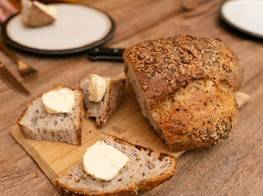
Our gastrointestinal tract is home to trillions of microbes with most of them located in our colon. The amount and types of bacteria vary from person to person. There is no consensus on what makes up a healthy microbiome. Since what we eat and drink pass through the gastrointestinal tract, our diet affects our gut microbiomes.
What are probiotics?
Probiotics are live microorganisms that provide health benefits for the human body. They can be administered orally (i.e. food, drinks, and dietary supplements) or non-orally (i.e. application to the skin). Probiotics are known by their genus, species, and strain. The two most studied groups of probiotics are lactobacillus and bafidoacterium.
Source
Probiotics can be found in fermented food such as yogurt, aged cheese, kefir, kimchi, sauerkraut, kombucha, and miso. They can also be found in dietary supplements or added into food such as fruit juices and protein shakes.
The item can only be called probiotics if it contains sufficient living microorganisms that survive food processing and these microorganisms provide benefits on human health.


Health benefits
Clinical trials are still on-going to find out the health benefits of probiotics. Strong evidence indicated that probiotics reduce the incidence and duration of antibiotic associated diarrhea. Probiotics is known to manage digestive discomfort including constipation, diarrhea, colitis and irritable bowel syndrome. Having adequate amount of probiotics in the gut helps reduce the number of bad micro-organisms which may cause infection and inflammation. Probiotics also help in metabolic health such as weight management, reduce blood cholesterol levels, also reduce blood sugar level and insulin resistance. Topical application of probiotic may reduce recurrent vaginal infection.
There are also some studies indicated probiotics help reduce the risk of atopic dermatitis in infants with high risk of allergy. However, insufficient evidence to support probiotics in treating food allergy and eczema in general. Some studies also found a correlation between probiotics and mental health. More clinical trials are needed to examine in greater depth.
Recommended intake
It is good to include probiotics in our diet both naturally from foods or dietary supplements. The probiotic dose is expressed as CFU (colony forming units). Probiotics should be used at a dose found to provide certain health benefit in studies. A higher dose in not necessary and a lower dose may not be effective. Individual should find supporting data on probiotics use for his or her particular health condition. However, probiotics shouldn't replace the medical treatments. Caution is advised for certain population taking probiotics. This includes patients with short bowel syndrome, immunocompromised individuals, and those with serious underlying illness. For these people, they should seek medical advice to ensure the use on probiotics is suitable.
Example of a Probiotics Rich Menu
Breakfast

Fruit yogurt with rolled oats
Lunch

Whole wheat bread with aged cheese slice
Vegetable and bean soup
Dinner

Miso soup with seaweed and mushrooms with Kimchi, Brown Rice
Steamed tofu drizzle with black bean sauce
















